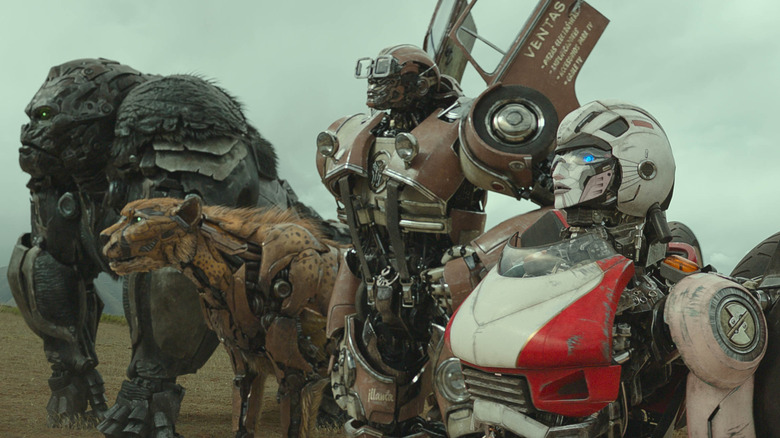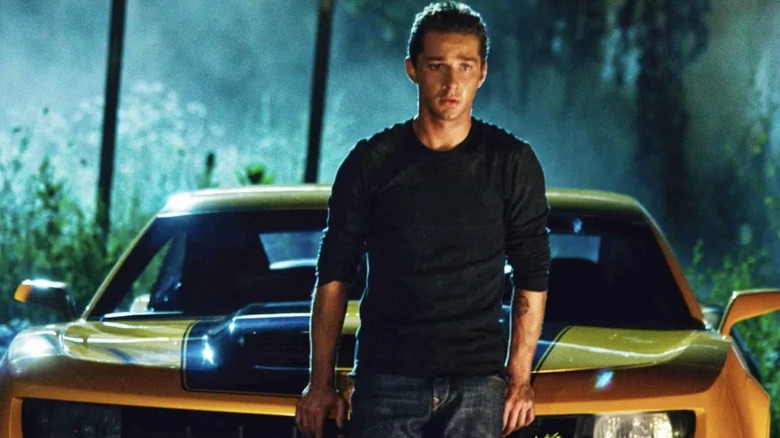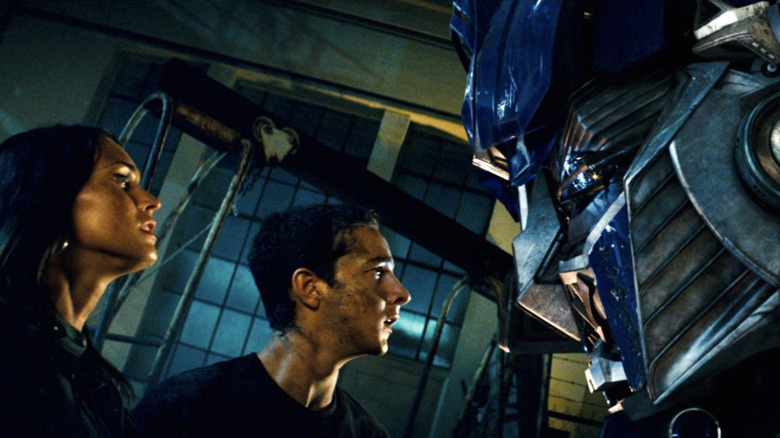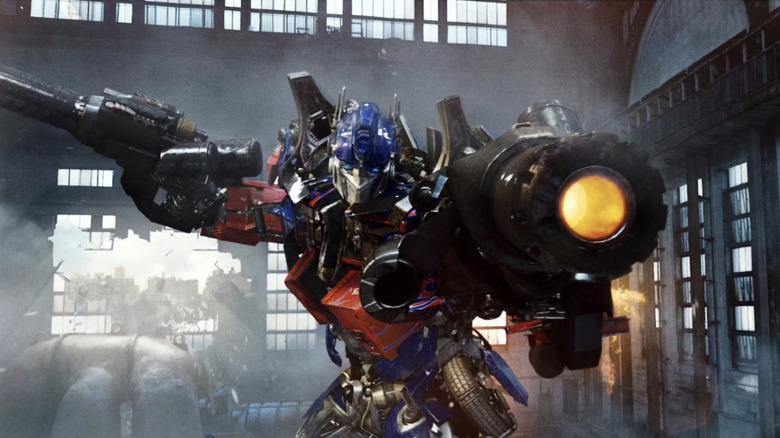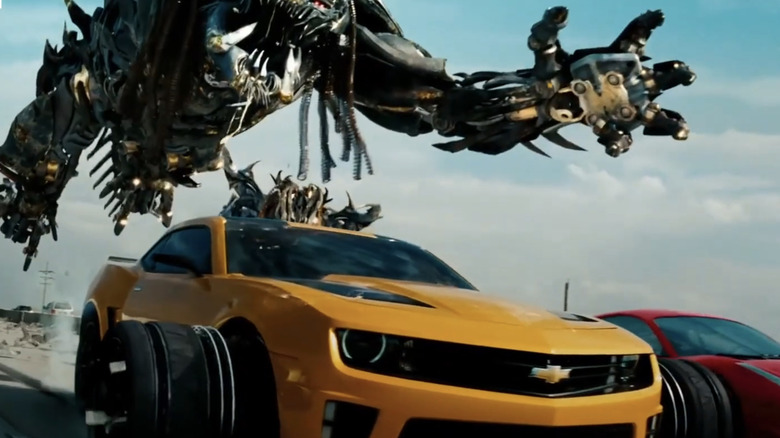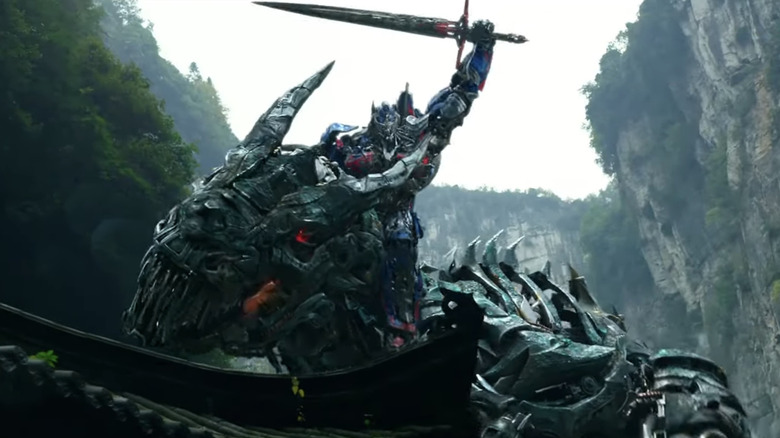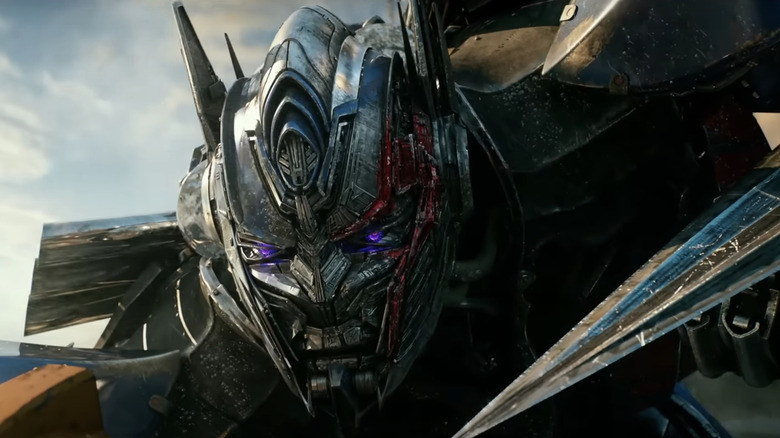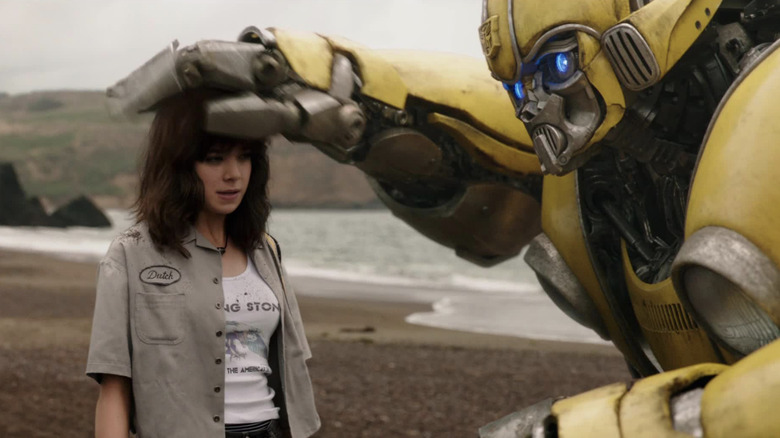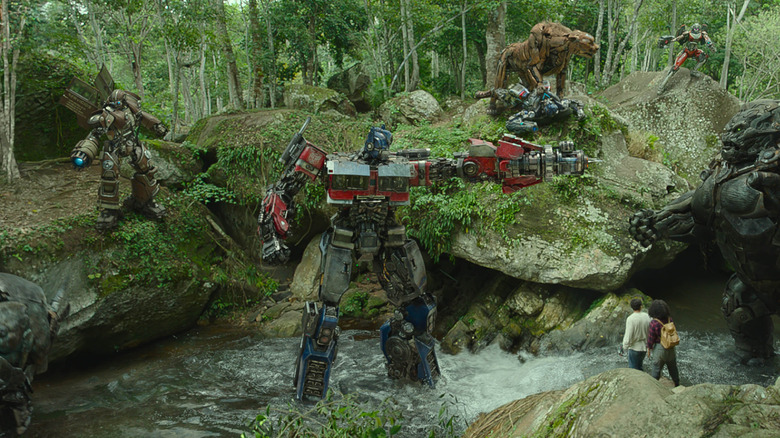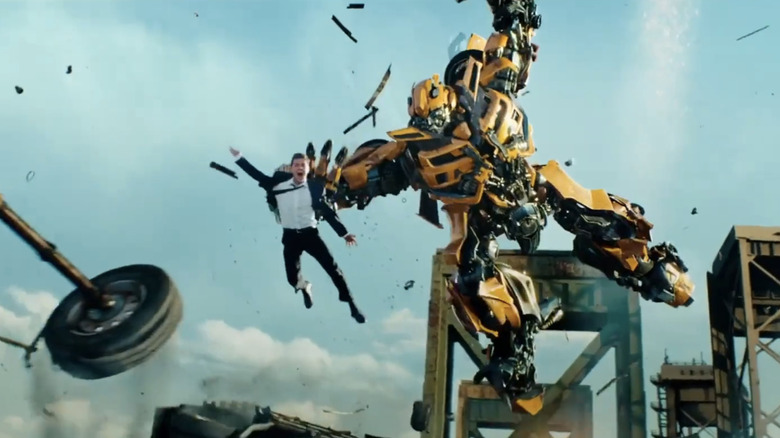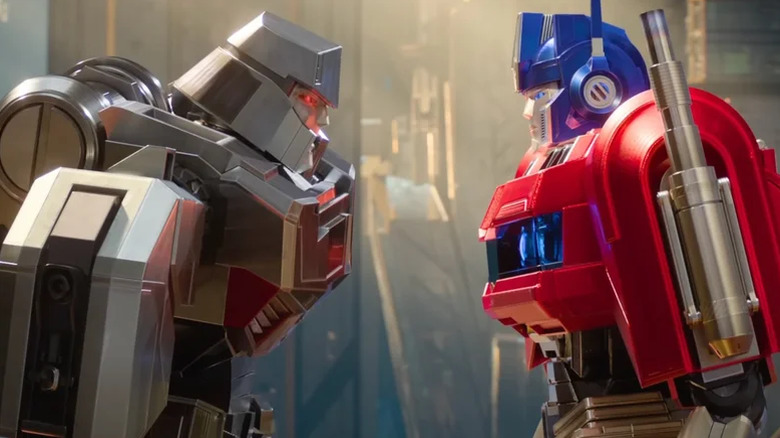How To Watch The Transformers Movies In Order
Back in 2007, "Transformers" was all the rage. After years of anticipation for the first live-action movie (produced by Steven Spielberg, no less), fans of the long-running robot franchise were finally getting to see their favorite Autobots on screen. Filled with plenty of CGI-peppered action sequences, dramatic explosions, and more lore than we know what to do with, the franchise has generated some impressive box office returns over the years. However you feel about the "Transformers" flicks — five of which were directed by Michael Bay — they're a permanent installation within pop culture that continues to find an audience.
But what order should one view these films in? Boasting seven entries in total, this franchise can be a bit confusing if you don't know where to start. Sometimes, keeping things simple is the best option, and that's certainly the case with the "Transformers" film series. Ever since that first feature in 2007, we've seen a new "Transformers" picture almost every two or three years. In fact, the only major gap is the five years between the two prequel films, which came out in 2018 and 2023. But don't let that fool you. There's no reason that you shouldn't watch the "Transformers" movies in the release order as follows:
- "Transformers" (2007)
- "Transformers: Revenge of the Fallen" (2009)
- "Transformers: Dark of the Moon" (2011)
- "Transformers: Age of Extinction" (2014)
- "Transformers: The Last Knight" (2017)
- "Bumblebee" (2018)
- "Transformers: Rise of the Beasts" (2023)
With this list in mind, let's dive into just why "Transformers" is best viewed in this initial release order. Believe it or not, it's not just because of the convenience.
Why is that the correct order to watch the Transformers movies?
Why is the release order best, considering there are two prequels included in this saga? Well, sort of like how watching the original "Star Wars" movies is a better starting point than diving into the prequels, the same logic can be applied here to "Transformers." For one thing, you don't need to know anything about "Transformers" or the franchise's long history in animation, comic books, and as a Hasbro toy line in order to watch the first Michael Bay film. The 2007 original is accessible to everyone, and it's through the eyes of Shia LaBeouf's Sam Witwicky that we come to understand the ever-shifting world around us.
Bay introduces the different factions of Transformers here flawlessly, with the strong and noble Autobots standing in clear opposition to the aptly named Decepticons. The 2007 "Transformers" is the clear gateway for both returning fans and newcomers and arguably the strongest film in the franchise as a result. From here, the series continues to build on itself, crafting new additions to the mythology, adding (and subtracting) both human and non-human characters, and raising the stakes far beyond recovering the AllSpark, as seen in the first film.
Although the prequels are fine additions that expand the narrative, they assume that we already know something about the "Transformers" world. To avoid any potential confusion, watch the movies in the order they were released.
Transformers
Is there a better "Transformers" movie than the very first one? While personal preference is certainly a factor when it comes to consuming these movies, the truth is that of all seven, 2007's "Transformers" is the tightest. The film begins as Megatron (Hugo Weaving) is discovered to have crashed on Earth. After the war between the Autobots and the Decepticons on their homeworld of Cybertron, the coveted AllSpark (the life-spark for all Cybertronians) is lost. Eventually Megatron discovers it on Earth — but is frozen in his attempts to retrieve it.
A century later, teenage Sam Witwicky (LaBeouf), the descendant of the man responsible for finding Megatron and the AllSpark, is thrust into this war by his car, which is secretly an Autobot agent known as Bumblebee (Mark Ryan). With Sam's help, the Autobots battle both Decepticon and human threats in their desire to save the planet from total annihilation.
Aside from being the live-action debut of characters like Optimus Prime (Peter Cullen), Megatron, and Bumblebee, "Transformers" is a solid action flick about a boy and his car. Okay, it's about more than just that, but the bond that forms between Sam and Bumblebee is a major highlight. There's also the love story that blossoms between Sam and his car thief crush, Mikaela Banes (Megan Fox), as this whole ordeal throws them into impossible circumstances. Oh, and lest we forget, the first film also introduces Captain William Lennox (Josh Duhamel) and Sergeant Robert Epps (Tyrese Gibson), who provide military support for our heroes.
Transformers: Revenge of the Fallen
The direct sequel to "Transformers," 2009's "Transformers: Revenge of the Fallen," picks up only a few years later. Sam is off to college, but rather than living a normal life, he is once again caught in the middle of the war between the Autobots and the Decepticons. But this time around, we discover that there are bigger threats out there than simple Decepticons like Megatron — namely Tony Todd's "The Fallen," a Cybertronian Prime who became the first Decepticon when he rebelled against the rest of his race. Now awakened, the Fallen aims to take revenge on all Primes, including Optimus, leading to a fateful confrontation that shocked audiences. Of course, Optimus Prime doesn't stay dead, but few do in this franchise.
Compared to the first film, "Revenge of the Fallen" suffers from poor pacing, bad jokes, and a messy plot. But hey, it does still have a killer soundtrack, which features "New Divide" by Linkin Park and other timely hits. Additionally, the "Transformers" sequel was also the last film in the series to feature Megan Fox in any capacity — and she was never the same after her "Transformers" exit. Frankly, neither was the franchise. "Revenge of the Fallen" is a sequel that's all spectacle with little substance and a serious downgrade from the original. Still, it's a necessary step that pushes the film series into its next phase and was a clear box-office success.
Transformers: Dark of the Moon
Rounding out the original film trilogy is 2011's "Transformers: Dark of the Moon." Set a few years after the previous film, "Dark of the Moon" catches up with Sam, who has since broken up with Mikaela and has moved on with newcomer Carly Spencer (Rosie Huntington-Whiteley). Establishing that the Apollo 11 moon landing was actually a coverup for alien technology, the film asserts that Megatron and his Decepticons have found a way to use technology from the Ark spacecraft to turn Earth into their homeworld.
By the end of "Transformers: Dark of the Moon," the Autobots suffer a major betrayal, and the city of Chicago is nearly decimated by the battle that ensues. Of course, our heroes come out on top, and Optimus Prime finally kills Megatron, seemingly for good.
Marking Shia LaBeouf's final appearance in the saga, "Dark of the Moon" is really the end of an era. If you wanted to, you could theoretically conclude your "Transformers" viewing here and simply enjoy the franchise as a trilogy. Despite the lack of Megan Fox, it's a satisfying conclusion that feels fairly definite compared to the previous installments. It also features some of the most impressive action sequences in the series, including the momentous Battle of Chicago and the freeway chase between Bumblebee, Sam, and the Decepticons. It's no wonder that "Dark of the Moon" made over a billion dollars. This is one sci-fi film with a terrible Rotten Tomatoes score that's worth watching anyway.
Transformers: Age of Extinction
After "Dark of the Moon" effectively concluded the series, "Transformers: Age of Extinction" returned with an extended runtime, a new cast, and Dinobots to bring audiences back to the theaters. It certainly worked, as "Age of Extinction" became Mark Wahlberg's highest-grossing movie. Wait, did we say Mark Wahlberg? With the exit of Shia LaBeouf, Wahlberg took over the leading man duties as Cade Yeager (yes, seriously), a Texas-based inventor who fixes Optimus Prime after the Autobot is nearly killed by the assassin Lockdown (Mark Ryan), who was sent by "the Creators." Somehow, this results in the return of the Dinobots, the resurrection of Megatron (now Galvatron, voiced by Frank Welker), and Optimus deciding that it's time to take the fight directly to his makers.
In addition to being Mark Wahlberg's highest-grossing picture, 2014's "Age of Extinction" was also the biggest film of the franchise, out-grossing even "Dark of the Moon." With a bloated runtime of nearly three hours, the fourth "Transformers" film is a lot to digest. Without any returning human cast members, "Age of Extinction" feels the most alien of the bunch. Even compared to the prequels (which also swap out the human cast), the narrative is largely separate from the previous three movies. It's clear that this film was meant to be the start of a new story (perhaps a new trilogy), but it simply isn't as effective as the 2007 film.
Transformers: The Last Knight
As the last "Transformers" film directed by Michael Bay, "Transformers: The Last Knight" felt like the end of another major era for the franchise. Released in 2017, a decade after the first film, we pick up with Optimus Prime returning to Cybertron to confront his makers. But he is soon brainwashed into becoming Nemesis Prime and sent back to Earth to find, you'll never guess, Merlin's staff.
Yes, "The Last Knight" mixes "Transformers" lore with the legend of King Arthur, and somehow makes it work as Mark Wahlberg's Cade Yeager returns to help the Autobots once again battle the Decepticons over the fate of the world. The film ends with Optimus killing Megatron yet again and Bumblebee seemingly ending the threat of Quintessa (Gemma Chan), the "Creator" who brainwashed Prime.
Rounding out Michael Bay's tenure with Optimus Prime, Bumblebee, and the rest of the Autobots, "The Last Knight" is even more of an ending than "Dark of the Moon" was. It effectively concludes the entire saga, as the Autobots finally leave Earth to return to their homeworld of Cybertron, which they have vowed to rebuild from the ground up. Neither critics nor audiences cared much for "The Last Knight," and though the film's connections to medieval history are fascinating, the picture ultimately falls short. As Bay's send-off to the film series, it's an interesting note to end on. Thankfully, there are better installments yet to come.
Bumblebee (2018)
Arguably the best addition to the franchise since the original 2007 film, "Bumblebee" is a prequel set in the late '80s that doubles as an origin story for the titular Autobot's time on Earth as well as a coming-of-age action flick. Long before he befriends Sam Witwicky, Bumblebee's first "owner" is Charlie Watson (Hailee Steinfeld). Bee and Charlie kick things off in a very "Iron Giant" fashion as the Autobot begins to recover his memories. As he does, the threat of the Decepticons reemerges, and more action ensues. Ultimately, Bumblebee leaves Earth to be reunited with his Autobot brethren, but this first taste certainly whets his appetite for the future.
Compared to the rest of the franchise, 2018's "Bumblebee" is the most standalone entry, which means that it can be enjoyed just as easily apart from the larger film series as with it. It doesn't retread the same ground already covered in previous installments and manages to have a lot more heart than one might think. While it didn't do quite as well financially as some of its predecessors, "Bumblebee" was still a financial success. It was also the first installment in years to receive high praise from both audiences and critics, proving that a solid "Transformers" story could be told on its own terms.
Transformers: Rise of the Beasts (2023)
The second prequel to the 2007 film and a follow-up to "Bumblebee," 2023's "Transformers: Rise of the Beasts" is the franchise's love letter to the long-beloved "Beast Wars" line of Transformers toys, animated projects, and comic books. Directed by Steven Caple Jr., the film takes place in the mid-'90s and follows Brooklyn native Noah Diaz (Anthony Ramos) as he finds himself in the middle of the strange war between alien robots.
If that sounds like just about every other "Transformers" movie, you'd be right. But this time, the Autobots team up with the Maximals, a group of Cybertronians who transform into animal-like forms (similar to Dinobots) to stop Unicron, a planet-eater who sets his sights on Earth.
In many ways, "Rise of the Beasts" is a step in the right direction from the previous installments. Though "The Last Knight" teased Unicron, this prequel took more cues from the original "Transformers" cartoons and felt more in the spirit of what many who grew up with the franchise loved most about it. Beyond that, "Rise of the Beasts" goes a bit further by attempting to launch a G.I. Joe/Transformers crossover, though that project has thus far failed to materialize. It doesn't help that the second "Transformers" prequel was one of the biggest box office bombs of 2023 – perhaps the years in between "Bumblebee" and "Rise of the Beasts" led to a loss of interest.
Is there another way to watch the Transformers movies?
Now that we've plowed through each of the "Transformers" movies, the question remains: is there a better way to watch them? If you're already familiar with the franchise and would prefer to watch the series in chronological order, you certainly could give it a go. Beginning with "Bumblebee" and then "Rise of the Beasts," the rest of the films can be viewed in the order they were released after that. This way, you begin with Bumblebee's first journey to Earth and his eventual departure from our world at the end of "The Last Knight." It may be a bit more somber a note to end on than "Rise of the Beasts," but it's certainly an option.
Of course, there are also teases from the prequel films that are not followed up in the Michael Bay-directed installments. Furthermore, watching them chronologically will likely lead to you uncovering more continuity errors in the franchise. But, if you insist on watching the events unfold as the Autobots would have experienced them, the chronological order is as follows:
- "Bumblebee" (2018)
- "Transformers: Rise of the Beasts" (2023)
- "Transformers" (2007)
- "Transformers: Revenge of the Fallen" (2009)
- "Transformers: Dark of the Moon" (2011)
- "Transformers: Age of Extinction" (2014)
- "Transformers: The Last Knight" (2017)
If you're a longtime "Transformers" fan, you may notice that a few films are absent from this list. Don't worry, we didn't forget about the animated productions.
What about the Transformers animated movies?
The animated "Transformers" films are not canon to the live-action franchise. The 2007 "Transformers" movie began a whole new franchise continuity that became mainstream due to the blockbuster nature of the subsequent installments. However, more traditional Transformers fans likely know that the 2007 film wasn't the first "Transformers" movie to hit theaters. That honor belongs to "The Transformers: The Movie," an animated flick that was released in 1986 and followed the narrative first explored in the animated "The Transformers" television series (often referred to as the G1 continuity). The movie takes place in between the second and third seasons of the animated series and thus is not connected to the later live-action films.
But what about "Transformers One?" The more recent animated film, released in 2024, was a standalone origin story of the friendship and later rivalry between Optimus Prime and Megatron. Voiced by Chris Hemsworth and Brian Tyree Henry, respectively, Optimus and Megatron (known here as Orion Pax and D-16) are friends who soon fall on different sides in a class war on Cybertron. Eventually, they become the characters we know them to be, with "Transformers One" being the nexus point for their long-standing hatred toward each other. However, "One" is entirely standalone and features no connection to the Michael Bay films whatsoever.
